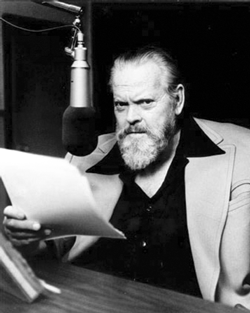Orson Welles: Gimme Fiction

Things have been quiet here for quite some time. This isn't because I gave up on blogging, or that it failed me in some technical way; I have found less time to write, or have found increasingly creative excuses for not writing, which is probably more apt. One of my more convincing rationalizations is a twofold excuse, fabricated by varieties of awe. The first is the ever pressing engagement with what might be seen as more pressing matters, mainly political, that constitute the lived experience of humanity, something of which art is part, but isn't the focal point for me. Secondly, tangentially, and undemocratically, it's the realization that when faced with Great Art in any media, why bother?
Therein lies the problem. Contained in Andrew Sarris' preface to his landmark survey of American movies from the late 20's to the late 60's, one gets the sense that it's incumbent upon the critic to not be intimidated by such Great Works, and probably not even consider them as such, which would go a long way toward preserving democratic participation in media criticism.
Clearly blogging has changed this somewhat, but there remains nonetheless a para-professional bent: the backscratching became evident well before major media tried to discredit blogging at all levels of professionalism. It's also my belief that Sarris' work launched a new thinking about American cinema and its influences in a way that deadened the high culture/low culture debate at its actual height, although nearly forty years later, it's still being argued, even though populist/popular forms of entertainment have more or less overwhelmed things like theater and classical music. That result was not what Sarris was arguing, although major media were poised to pursue those artistic forms that guaranteed the greatest return, even as he wrote - the Sixties demonstrated the ability of B cinema to grow audiences and the durability of pop music in all forms.
But this newly stratified media - from zines to the New York Times - have opened opportunities in criticism that are astounding. Anyone can participate in a debate, provided they have readers or the wherewithal to comment persistently enough (without being blocked) to establish themselves as a voice (or in Sarris' vernacular, become a "tree") in the ghoulish media forest. In the past six months, the forest proved serene and not worth stirring: as I immerse myself in new films and music and am introduced to new artists of all kinds, past and present, I've found myself struggling to regain footing. For me it's been a case of Odysseus meeting Heisenberg, and the veritable wanderer cannot simply reflect on position or movement, the place and time being secondary to the discovery itself. With that in mind it's my intention that this blog becomes something other than a site for superlative pronouncements (unless otherwise warranted) and instead a film diary where entries are made as notes and observations based on films viewed, a far less daunting task than director and talent retrospectives for which I am generally unqualified.
One such discovery (that's not much of a discovery at all, since he's more or less the grandfather of American independent cinema) has been Orson Welles. With the recent release of the counterfeit masterpiece F for Fake, Welles caught my eye and immediately captured my imagination; the notions of authenticity and "the expert" being at stake, as well as customary ideas about value/worth/price that are often inseparable from discussions of art, art being a commodity first and a spectacle second. Gaddis' The Recognitions (not to mention William Gass' humorous introduction) immediately came to mind as I watched in mock horror as several illusions unfolded before me: the first being the biographical account of Elmyr de Hory (his Court TV entry is here; Wikipedia entry here) and Clifford Irving, de Hory's biographer, imagining an "official" autobiography of Howard Hughes. Like the magician he portrays, Welles narrates, positions and repositions the various subjects before the viewer, manipulating the story and its effect in plain sight.
But this, I would learn upon further inquiry, was Welles' trump card. After all, he announces, wasn't he the man who terrified listeners with a fable about the end of the world brought upon us by aliens, inspiring a panic despite several reassurances that it was indeed fiction? From the outset Welles took on only the largest personalities when he deigned to act as well as write and direct, and in so doing fashioned a penumbra personality that eclipsed even his own status - indeed, his performance as a sociopathic Texas baron in Man in the Shadow suggests the comparison itself, as does his performance in The Third Man where his character literally hides in the shadows even as he commands all of the film's action and Joseph Cotten's motivation!
Welles' shadowy career has come under repeated scrutiny. Verily, Sarris' names him as both a studio victim and one of his own ambitions, the very creativity that put him at odds with his financiers. Forced to work to produce his own material, Welles captained a lifeboat against the icy obstacles and floes that kept him from creating willy nilly, stifling his potent imagination and inhibiting the impulse to put down a project to move on to something newer and more interesting. F for Fake contains a documentary that catalogues his unfinished projects, some of which seemed very promising, including his last attempt at a full-length film, The Other Side of the Wind, which would've starred Peter Bogdanovich and John Huston. That he never finished it, and couldn't finish Don Quixote struck me with so much sadness while watching, even moreso than Lost in La Mancha.
If you're interested in further reading, I stumbled upon Wellesnet.com moments ago. It's a nice if modest resource. I'll have more later, including comments on The Magnificent Ambersons, The Lady from Shanghai and Mr. Arkadin.

0 Comments:
Post a Comment
<< Home